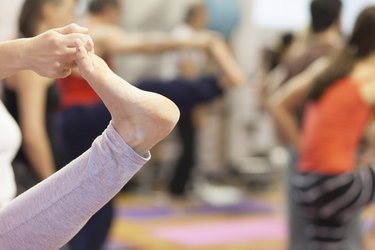
It can be disturbing to develop cold feet while you are exercising, particularly if symptoms are new. Exercise-related cold feet can be caused by many factors and conditions, some that require medical intervention. Because of this, it is important to understand what can cause cold feet to occur during or after exercise and how it can be remedied. Consult your doctor to discuss the issue or if the symptoms persist or worsen.
Symptoms
Video of the Day
Cold feet during or after exercise can vary from mild to extreme. It can be accompanied by the sensation of your feet or toes of falling asleep, tingling, numbness, intense sensitivity to touch, burning pain and even bladder- or bowel-control problems. Symptoms can be localized to your feet or may extend up toward your legs and arms. You can also experience problems with coordination and weakness in your muscles, which can make exercise or even walking difficult.
Video of the Day
Causes
Cold feet can occur if the nerves in your feet are compressed while exercising. For instance, improper shoes or ill-fitting socks can bunch up and put pressure beneath your foot as you exercise, restricting circulation and resulting in coldness and numbness. Trauma, such as falling or colliding with an object during exercise, can also put pressure on or damage the nerves in the feet, resulting in symptoms. Repeated or unnatural movements during exercise can also trigger cold feet and numbness. Cold feet can also be due to certain conditions such as fractures, bone spurs, joint swelling and cysts.
Treatments and Prevention
Take an anti-inflammatory medication like naproxen to help treat any swelling around the nerves in the feet, which can reduce symptoms. Wear appropriately fitting shoes that cushion your feet and offer adequate support. Place an arch support in your shoes to help take pressure off the bottom of your feet while exercising. Do not overstress your feet during exercise -- alternate intense exercise with less stressful exercise such as swimming or walking.
Warnings
Do not ignore cold feet during or after exercise. The reduction in sensation can make you less likely to notice an injury or any changes in temperature. Seek medical attention if exercise-related cold feet are severe, chronic or accompanied by the appearance of ulcers, foot cramps at night or pain that worsens when your feet are elevated. These could be symptoms of a serious medical condition such as peripheral artery disease where the blood vessels and arteries that lead to you your legs and feet harden, the PubMed Health website warns.
Is this an emergency? If you are experiencing serious medical symptoms, please see the National Library of Medicine’s list of signs you need emergency medical attention or call 911.